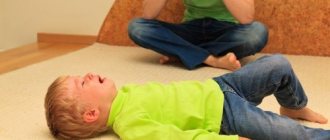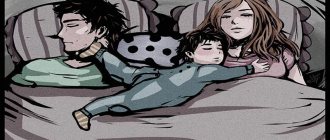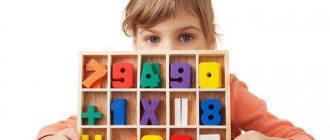Anxiety disorders
- These are neurosis-like mental states, the main symptom of which is a feeling of anxiety.
Such conditions differ from the usual fears and anxieties that can always be observed in children during their development. Feelings of fear, danger, anxiety are the most important adaptive signals in the psyche of every person and accompany us throughout our lives. But in certain cases, the mechanisms that regulate the intensity and duration of anxiety fail and then the normal course of psycho-emotional development is disrupted.
Anxiety disorders can be of several types depending on their manifestation:
Social anxiety disorder
- fears of meeting or communicating with people;
- avoidance of social situations;
- lack of friends outside the family
STORY
The girl Olya, 10 years old, was very often worried. Every morning she worried whether she would be late for school, although she always arrived at school on time. Every day she worried, did she put everything in her backpack? At night she worried about whether she had done her homework well and whether her clothes would look neat the next day?
Olya's parents thought this behavior was a typical part of growing up. Gradually, the girl began to study worse, was often in a depressed mood, and her relationships with her friends went wrong. Unable to influence their daughter, to change her attitude to what was happening, the parents decided that it was time to talk with a specialist about how to find a way to help Olya cope with her anxiety.
Symptoms of increased anxiety
“Sometimes it seems to me that there is no situation that she would not worry about. Literally everything worries her: darkness, thunderstorms, elevators, loud noises... She is still afraid to fall asleep alone - and she is already nine years old! For me this is nonsense. At her age, I was brave, I was already climbing into garages with all my might with the boys and saying that I was already an adult. And she is a very delicate flower. I’m already silent about strangers, and about acquaintances too. Teachers complain that the girl is capable, but she is so shy that she cannot answer in class, remains silent, and may even cry. At home she cries again and says that she will never succeed, that she is stupid, that she is the worst of all. He doesn’t want to do anything - neither sports, nor music, nor drawing. Afraid that it won't work out. Although he loves to read, he helps around the house, so it’s not a matter of laziness at all. I feel very sorry for her, I constantly talk, try to calm her down, never scold her, but nothing changes.”
Victoria, mother of 9-year-old Sasha
You can talk about increased anxiety if your child regularly displays the following signs:
- self-doubt, low self-esteem;
- fear of new things or people;
- refusal to perform work that involves difficulties;
- fears that do not correspond to age: if a child over seven years old is afraid to go to school, go outside, stay at home alone, fall asleep alone;
- sleep disturbances, nightmares;
- decreased appetite;
- “bad habits”: the child bites his nails, constantly twirls his hair around his finger, pulls out his hair, etc.;
- tearfulness, vulnerability;
- stiffness in a new environment;
- attacks of anger, irritability;
- many phobias.
Anxiety attacks are also accompanied by physiological manifestations: rapid heartbeat and breathing, dry mouth, trembling, digestive disorders and other signs - the symptoms are individual for each child. [2]
Causes of anxiety disorders
It is difficult to name the exact cause of such a disorder in a child, as well as in an adult. Experts name a number of provoking factors:
- Genetic predisposition.
Having an anxiety disorder in a parent increases the risk of similar symptoms in a child. - Stressful life circumstances.
Events in a child’s life can become a starting point (trigger) for anxiety disorders in childhood or adulthood: loss (death of a loved one or divorce of parents), life changes (moving to a new city, changing schools, going to kindergarten). Children who have experienced abuse are more likely to have anxiety disorders. - Upbringing
. Growing up in a home where other family members are constantly anxious can teach a child to view the world as a dangerous place. If a child grows up in a truly dangerous environment (domestic violence), he may experience excessive stress, fear and expect the worst.
Increased anxiety in a child: what to do
If your child suffers from increased anxiety, treatment should begin as soon as possible. Otherwise, this personality trait will most likely remain with him for life. As an adult, it will be more difficult to cope with it. We offer several ways to help your child overcome anxiety and increase his resistance to stress. These same tips can also be used to prevent anxiety disorder if your child is prone to it.
Learn to control your anxiety
Let us repeat again: children are most influenced by the behavior of their parents. Therefore, you need to start working with anxious children by defeating your own anxieties. If children see that adults are calm, trust the world and are not afraid to meet it halfway, they themselves will naturally become bolder and calmer.
Rethink your parenting style
Before treating your child for anxiety, think about whether you are asking too much of him in life. Maybe we should reduce his workload. For example, allow him not to go to a circle that he doesn’t like. And, of course, you cannot scold children for mistakes and failures, otherwise fear will constrain them before any new endeavor. Help your child cope with a difficult situation for him, show that you can be trusted. Remember: if a child perceives you as a source of danger and punishment, he will constantly feel fear and loneliness.
Teach your child to cope with difficulties independently
Do not rush to help the child until he asks for it, do not try to protect him from all difficulties. Let him know that you are there and will always help if necessary, but believe that he can handle it on his own. This way, the child will definitely believe in himself and will not give in to the slightest difficulties. And, of course, do not criticize for failures: it is better to praise for courage and independence and invite them to think together about how to correct the mistake. This will instill responsibility and stress resistance in the child.
It is also useful to have a pet - for example, fish, a turtle or aquarium snails - and entrust your child with some responsibilities for caring for it. The child will feel big and strong compared to his pet, this will strengthen his self-confidence and sense of self-worth.
Love your child for who he is
This means that you need to accept not only your child’s strengths, but also what you consider shortcomings - most likely, these are not shortcomings at all, but personality traits that make him different from others. Never compare your child with other children, praise him more often and tell him that you love him in any situation. A safe and comfortable environment at home, good relationships with parents reduce anxiety and increase stress resistance in children.
Helping an anxious child
Anxiety disorders in children are dealt with by mental health specialists: psychologists, psychotherapists, psychiatrists. The specialist analyzes the symptoms, diagnoses a specific anxiety disorder, and outlines a plan to help the child.
Through work with a psychologist, children learn to think and act differently in situations that may cause anxiety, as well as cope with stress. The specialist provides support and guidance. Sometimes drug treatment is necessary.
Exercises to reduce anxiety in children
Also, the recommendations of the French teacher M. Borba can help an anxious child. She offers several simple exercises that are aimed at relieving stress in children. They can be used in combination or separately. They turn anxiety management into a game, which improves performance. [2]
- Internal dialogue. Find a phrase with your child that will increase his self-confidence and teach him to say it in a stressful situation. For example: “I will succeed”, “I can handle this”, “There is no reason to worry.”
- Elevator breathing. Invite your child to close his eyes, exhale three times, and then imagine that he is going down in an elevator from the top floor to the first. Once the elevator reaches its destination, the excitement will disappear. You can also use any other breathing exercises to combat anxiety.
- Melting away stress. Ask your child to find a place where tension accumulates. Usually this is the neck, shoulders, jaws. You need to strongly tense this place, and then sharply relax it and feel how the clamp leaves the body.
- Visualization of a calm place. When a child is overcome by anxiety, he can imagine a place where he feels calm and happy. This helps because, firstly, the child is mentally transported to a safe environment, and secondly, in principle, he is distracted from restless thoughts.
How parents can help
- The best way to help your child is to acknowledge the problem and provide support without criticism. Try to observe more carefully what causes difficulties for your child in everyday life and how he reacts to them.
- Contact a specialist to assess the child's condition.
- Be patient and positive if psychotherapy . In the process, the child will learn new ways of coping with anxiety.
- Sometimes it helps to talk to your child about your own stresses and how you were able to overcome them.
- Rest assured that with the right approach, your child will be able to overcome anxiety , learn to look into the future without unnecessary stress, and realize their full potential.
Test: your child's anxiety level
Sometimes it is difficult for parents to determine whether the child’s anxious state has exceeded acceptable standards. To answer this question, we offer the “Child’s Anxiety Level” questionnaire, based on observations. [1] Read the following statements and mark those with which you agree:
- A child cannot work for a long time without getting tired.
- He has difficulty concentrating on anything.
- Any task causes unnecessary anxiety.
- While performing tasks, he is very tense and constrained.
- Feels embarrassed more often than others.
- Often talks about tense situations.
- As a rule, blushes in unfamiliar surroundings.
- He complains that he has terrible dreams.
- His hands are usually cold and damp.
- He often has upset bowel movements.
- Sweats a lot when excited.
- Doesn't have a good appetite.
- Sleeps restlessly and has difficulty falling asleep.
- He is timid and fears many things.
- Usually restless and easily upset.
- Often cannot hold back tears.
- Doesn't tolerate waiting well.
- Doesn't like to take on new things.
- Not confident in myself, in my abilities.
- Afraid to face difficulties.
If the number of positives exceeds 15, your child most likely has an anxiety disorder. If you answered positively to 7 or more statements, your child is at risk. We advise you to pay attention to the problem and take measures to prevent and treat increased anxiety.
Types and types of restlessness
If changes in behavior are noticed, especially that the child is anxious, expert recommendations prescribe seeking advice from a doctor. Treatment will depend on several factors.
There are two types of anxiety:
- Anxiety as an established character. In this case, the characteristics of personal temperament and copying the behavior model of unbalanced adults play a role.
- Anxiety is situational. It is usually caused by individual events.
Children suffering from anxiety are divided into several types:
- Neurotics. An increased degree of anxiety in such children leads to somatic disorders, namely tics, stuttering, and uncontrolled urination.
- Disinhibited children. This type of childhood anxiety is expressed in the form of increased activity and excessive emotionality.
- A shy child who is afraid of almost everything.
- Closed children. This type is characterized by coldness, lack of responsiveness, and increased alertness of the baby.
Increased self-esteem
The work of a psychologist with an anxious child includes three components:
- Increasing your child's self-esteem.
- Developing skills to manage your emotional state.
- Exercises to reduce muscle tone.
It is quite natural that it is impossible to quickly raise a child’s self-esteem. It is important to carry out appropriate activities daily. Address the baby by name, praise him for the slightest achievements alone and in the presence of other children. At the same time, approval must be sincere, since every child feels and reacts painfully to falsehood. It is imperative to say why he is being encouraged.
Let's look at the remaining elements in more detail.











